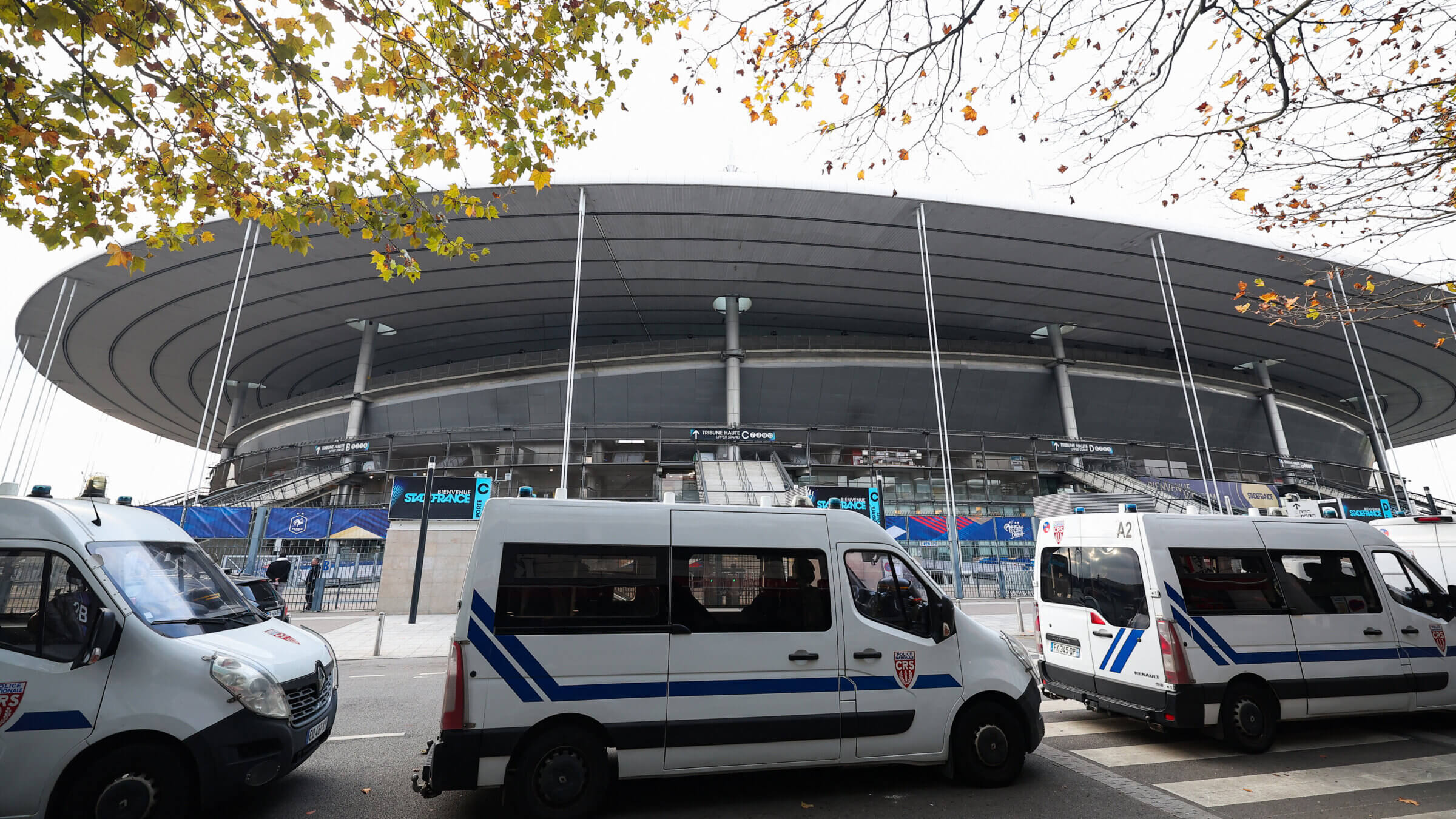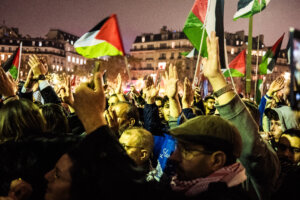As Israel faces off against France, the true battle will be taking place off the field
Thousands of police will be on hand for a soccer match in a stadium that will be less than half-full

French riot policemen secure the Stade-de-France ahead of the training for the French and Israeli teams. Photo by Getty Images
“If war is politics by other means, than soccer is politics at times of war.”
These are not quite the famous words of Carl von Clausewitz, but if he were alive today, he might well make them his own. In the wake of the French revolutionary wars, the German military theorist was the first to grasp that while wars have many causes, political and ideological convictions were not the least of them.
As the world now knows, the violence that engulfed Amsterdam last week mostly ensued after a soccer match between Amsterdam Ajax and Maccabi Tel Aviv. The fog of this battle has yet to fully lift, and many details remain blurred. According to the Dutch chief of police, supporters of the Maccabi team tore down and burned a Palestinian flag, shouted obscenities and vandalized a taxi. At the end of the match, as the hundreds of Maccabi supporters left the stadium, they were attacked by several knots of young men. Many of the assailants were on mopeds or electric scooters, pursuing and assaulting supporters wearing Maccabi scarves. There were yet other chilling instances when thugs, surrounding individuals not wearing Maccabi merch, demanded to know if they were Israeli, or more tellingly, Jewish, and even demanded to see their passports.
While the debate continues over whether these loathsome incidents qualify as a pogrom, they certainly qualify as a public relations disaster for the Dutch government. It is a repeat of that disaster that the French government is now madly scrambling to avoid as it prepares for a Nations League match tomorrow night between the French and Israeli teams.

Decreed long ago by the fates of football, the outcome of the match itself is not in doubt. The Israeli team, Nivheret Israel, is ranked as 81st in FIFA’s global standings — sandwiched between Oman and Angola — while the Bleus of France, in second place, are nipping at the heels of the Albiceleste of Argentina. What had at first been in doubt, though, was whether the game would take place. Two days after the violence in Amsterdam, these doubts were dispelled by Bruno Retailleau, the new and hardline Minister of Interior. In a post on X, he declared that “France is not backing down because that would amount to giving up in the face of threats of violence and antisemitism.”
Shortly after Retailleau’s declaration, President Emmanuel Macron announced that he planned to attend the match to cheer on the Bleus, but also “to send a message of friendship and solidarity in the wake of the intolerable acts of violence after the match in Amsterdam.” Ditto for Prime Minister Michel Barnier and former president Nicolas Sarkozy, who also announced their rendezvous at the Stade de France. Benjamin Haddad, the Minister of European Affairs, who sparked controversy earlier this year by opposing a cease-fire in Gaza, declared his satisfaction that France had not “ceded to intimidation” and guaranteed both the Israeli team and its fans that they would receive the same welcome given to Israeli athletes and supporters during the Olympic Games.
By “threats” and “intimidation, the ministers perhaps had in mind not just the specter of street violence by pro-Palestinian demonstrators, but also organizations that had been pressuring the government to cancel the match. The movement EuroPalestine, after failing to persuade authorities to call off the game, is urging the French players to seize this “privileged and historic moment” by refusing to take the field for what it describes as the “France-Genocide match.” Meanwhile, other political movements and organizations, including the hard-left Defiant France, some of whose members are antisemitic-curious, have called for a protest demonstration for Wednesday afternoon.
It is less probable, however, that these same ministers had in mind a gala scheduled for Wednesday night. The event, billed as “Israel is Forever,” offers attendees a choice of tables named “Hebron,” “Golan,” and “Judea” — not coincidentally the regions that nationalist extremists claim as part of Israel — while listening to a series of rants by yet other French and Israeli rightwing fanatics. The French organization hosting the gala, also named Israel is Forever, is led by Nili Kupfer-Naouri, a well-known figure on the far-right who insists that the notion of a Palestinian people is a myth and has justified the deaths of tens of thousands of Palestinian civilians by claiming that “there are no innocents in Gaza” and that its population “must shed tears of blood” for the Oct. 7 massacre.

Despite an appeal by several humanitarian NGOs to cancel the event on the grounds that it violates the letter and spirit of international law, the French government has declared the show can go on. Unfortunately for those who have already forked over 260 euros for a ticket, the show will not include the star it had been promised, Israel’s official minister of finance and unofficial master of the occupied territories Bezalel Smotrich. At the last moment, no doubt due to pressure applied by French authorities, Smotrich announced that he would not attend the gala. (There remains a good chance, though, that he will still address the guests by way of a virtual appearance.)
As for the match, it will not be difficult to spot France’s political leaders in the stands. Not only has the Israeli government, officially for reasons of safety, discouraged its citizens from attending the match, but the massive security apparatus mobilized by the French government will discourage many others from attending. More than 4,000 regular and riot police will be on hand for the match, as well as the stadium’s 1,400 security guards. Fans determined to watch the game will first need to navigate a veritable obstacle course of security checkpoints to enter the stadium. As a result, probably fewer than 20,000 seats will be filled in the 80,000-seat stadium.
When I was a teenager, I had pinned a Day-Glo poster to my bedroom wall. It featured a black globe and blood-red flames framed by a question: “Suppose they gave a war and nobody came?” It was the sort of question, of course, that only a 16-year-old could take seriously. When leaders give wars, civilians most often have no choice but to join. This includes the more than one thousand Israelis killed on Oct. 7 and the more than 40,000 Palestinians killed since October 7. As the array of armored and armed security personnel for Thursday night’s enactment of the world’s most beautiful sport will remind us, it is a war that has spread far beyond Gaza and Israel, and one to which all too many, whether they wish to or not, have been invited.
Editor’s Note: A previous version of this story referred to allegations that Maccabi supporters shouted slogans and engaged in violent acts prior to the match with Amsterdam Ajax. Since we were unable to corroborate that this happened before the match, we have updated the story.























